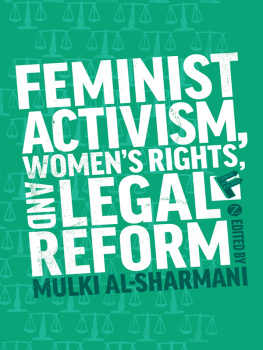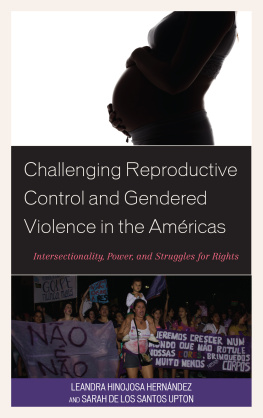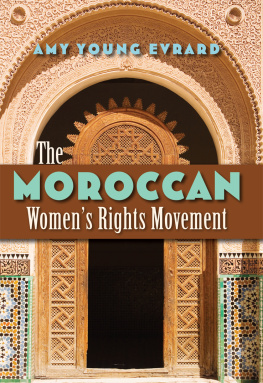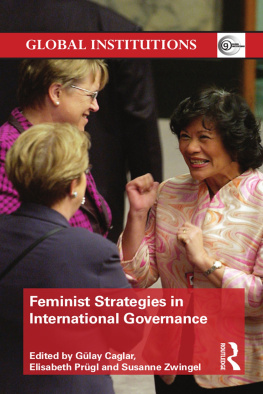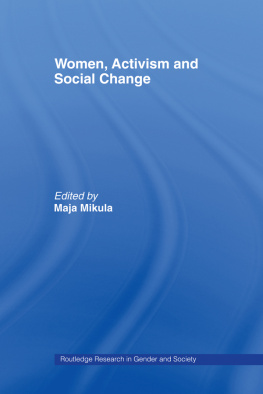
FEMINISMS AND DEVELOPMENT
Disrupting taken-for-granted assumptions, this expert series redefines issues at the heart of todays feminist contestations in a development context. Bringing together a formidable collective of thinkers from the global South and North, it explores what it is that can bring about positive changes in womens rights and realities.
These timely and topical collections reposition feminism within development studies, bringing into view substantial commonalities across the countries of the global South that have so far gone unrecognized.
Series editor
Andrea Cornwall
Forthcoming titles
Voicing Demands:
Feminist Activism in Transitional Contexts
Sohela Nazneen and Maheen Sultan
Feminisms, Empowerment and Development:
Changing Womens Lives
Andrea Cornwall and Jenny Edwards
Changing Narratives of Sexuality:
Contestations, Compliance and Womens Empowerment
Charmaine Pereira
About the Editor
Mulki Al-Sharmani is an Academy of Finland research fellow and lecturer in the Study of Religion Unit, Faculty of Theology, University of Helsinki. She is also a member of Musawah, the Global Movement for Equality and Justice in the Muslim Family. Al-Sharmani has researched and published on transnational migration and Somali diaspora(s), child protection and social welfare policies in Egypt, gender and Muslim family laws in Egypt, and Islamic feminism. After completing a PhD in cultural anthropology at the Johns Hopkins University in 2005, Al-Sharmani worked as a researcher and taught at the American University in Cairo from 2005 to 2010, and was a research fellow at Helsinki Collegium for Advanced Studies from 2010 to 2011.
Feminist Activism,
Womens Rights,
and Legal Reform
edited by
Mulki Al-Sharmani

Zed Books
LONDON & NEW YORK
Feminist Activism, Womens Rights, and Legal Reform was first published in 2013 by Zed Books Ltd, 7 Cynthia Street, London N1 9JF, UK and Room 400, 175 Fifth Avenue, New York, NY 10010, USA
www.zedbooks.co.uk
Editorial copyright Mulki Al-Sharmani 2013
Copyright in this collection Zed Books 2013
The right of Mulki Al-Sharmani to be identified as the editor of this work has been asserted by her in accordance with the Copyright, Designs and Patents Act, 1988
Designed and typeset in Monotype Bembo by Kate Kirkwood
Index by John Barker
Cover design: www.alice-marwick.co.uk
All rights reserved. No part of this publication may be reproduced, stored in a retrieval system or transmitted in any form or by any means, electronic, mechanical, photocopying or otherwise, without the prior permission of Zed Books Ltd.
A catalogue record for this book is available from the British Library
Library of Congress Cataloging in Publication Data available
ISBN: 978 1 78032 965 9
This work would not have been possible without the support of a number of colleagues and institutions. First, I would like to extend my thanks to the Pathways of Womens Empowerment research programme, which supported both the book project and the research for the chapters on Egypt, Bangladesh, and Brazil. My special thanks to Andrea Cornwall, the coordinator of the Pathways project, for offering insightful feedback on the manuscript as well as writing the preface. My thanks are also due to Jenny Edwards, the programme administrative coordinator at Pathways, for assisting with the editing and formatting of the manuscript.
Special thanks also to Ziba Mir-Hosseini, independent legal anthropologist, professorial research associate at the Center of Islamic and Middle Eastern Law at the School of Oriental and African Studies, University of London, and co-founder of Musawah, the Global Movement for Equality and Justice in the Muslim Family. I am grateful to Ziba for reading the manuscript and offering thorough and insightful comments.
I would also like to thank the Social Research Center at the American University in Cairo (AUC) and its director, Hoda Rashad, for the support and assistance I received for my research on family law reform in Egypt while employed at the Center. Special thanks go to my colleague Hania Sholkamy, associate professor of anthropology in the Social Research Center at AUC and the coordinator of the Middle East hub in the Pathways project. I thank Hania both for inviting me to take part in Pathways, and thus giving me the opportunity to research family law reform in Egypt, and for her helpful input in that research. I am indebted to my colleagues Marwa Sharaf El Din, Egyptian activist, doctoral candidate at Oxford University, and a member of Musawah; to Sawsan Sharif, researcher at the Social Research Center at AUC; and to Fayrouz Gamal, research assistant at the same institution, for their contributions to the research on Egypt.
I thank the Helsinki Collegium for Advanced Studies, University of Helsinki, for awarding me a one-year research fellowship post that provided the time and support to work on this book project.
Last but not least, I would like to thank all the distinguished colleagues who contributed to this volume.
Andrea Cornwall
Feminist engagements with the law reveal the complex relationships between legal framings and processes, and social domains, practices, and institutions. Law is an instrument that can be used in the pursuit of gender justice. But it is equally an obstacle to the achievement of greater gender equality. The legal arena is, then, both a site of oppression and an important means of social transformation.
Feminist legal scholarship has drawn attention to the nuanced interplay between legal reforms and feminist activism, and strategies, tactics, and struggles that animate the use of the law to create, contest, or challenge social meanings and practices. This books rich array of case studies from diverse geographical contexts brings these dynamics to life. Focusing on the domain of family and domestic violence legislation, these studies explore newly introduced or proposed laws, setting them in the context of legal and societal debates and contestations, strategies of mobilization of different actors, and the mobilization of meanings in the legal arena. In doing so, they chart the role of law and legal strategies in pathways of womens empowerment.
Feminist Activism, Womens Rights, and Legal Reform forms part of a series, Feminisms and Development, which has grown out of a multi-disciplinary research programme, Pathways of Womens Empowerment. Pathways began in 2006 as a consortium of researchers convened through regional hubs in Africa, Asia, Latin America, and the Middle East, with a cross-cutting focus on global policy processes. The consortium set about a multi-stranded enquiry into the processes of change in womens lives, exploring not only efforts to instigate change through laws, policies, and programmes, but also hidden pathways made possible through more diffuse economic, political, and cultural changes. Inter-regional connections were built through cross-hub working groups on work, body, and voice, giving rise to a number of collective, comparative research projects that provide the basis for this series, with titles reflecting the scope and range of enquiry.
The multi-sited comparative project that produced this insightful collection sought to take questions of voice into an enquiry into whether law and legal reform could constitute a pathway of empowerment. Mulki Al-Sharmani brings together in this book studies by Pathways researchers working on law reform and the introduction of new laws in contexts that offer some particularly interesting lessons from the new family courts in Egypt to the civil society monitoring of the implementation of the landmark 2006 domestic violence law in Brazil; and from the intense contestation that accompanied the passing of domestic violence laws in Ghana to the movement for a uniform family code in Bangladesh. The collection also brings to comparative analysis scholarship in and from Yemen, Iran, Morocco, and Palestine, contexts which are more rarely available to feminist scholars internationally.
Next page
